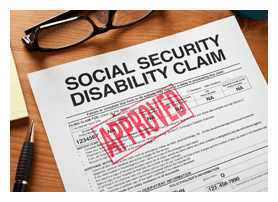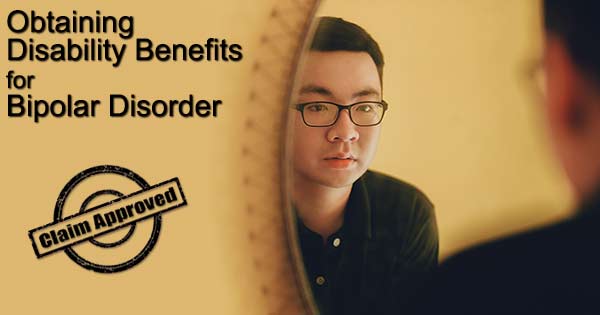Is Bipolar Disorder a Disability


Bipolar and Disability Benefits
Is bipolar disorder a disability? The short answer is that yes, bipolar disorder is a disability and you can get disability benefits for having bipolar disorder.
You just have to follow a process to ensure that you get the benefits. I am on disability myself for bipolar disorder.
I was denied the first time because I didn’t have everything that I needed including medical records and doctors reports but I was approved on appeal once I had all of the proper documentation that I needed.
Bipolar disorder (Manic Depression) is included in the Social Security impairment list for ssdi benefits, meaning if your disorder has been diagnosed by a qualified health professional and is serious enough to prevent you from working, you are eligible for disability benefits.
Bipolar Disorder is a mental impairment that can prevent you from working. Because Bipolar is listed in the SSAs impairment listing guide, a person with Bipolar who wants to file a claim for disability benefits may win after meeting certain criteria.
The Social Security Administration will automatically award disability benefits for depression or bipolar disorder if you can prove that you have symptoms and limitations listed on the Social Security official list of disabilities for depressive disorder or bipolar disorder.
The process of determining eligibility for disability for bipolar is done by having a disability evaluation to which you are given a disability rating. This rating includes multiple factors including work history, hospital stays, the severity of the disability, and more.
Bipolar Impairment
If a person’s bipolar disorder is persistent and interferes with all capacity for functioning in the work environment, the individual may be eligible for SSD disability benefits.
Any person with Bipolar Disorder can qualify for disability benefits if they/they meet the evaluation criteria listed in the Social Security Administrations Blue Book, and if they/they receive medical vocational impairment approval based on residual functional capacity, education, and age of the person.
As a disability benefits lawyer can explain, the Social Security Administration (SSA) maintains a list of impairments, which includes both medical and mental health conditions, which are considered serious enough to keep an individual from working.
Every state generally abides by the same eligibility guidelines for bipolar disorder disability.
Bipolar Disability Eligibility
To qualify for disability benefits under the SSA, you must have a serious or prolonged medical diagnosis that makes it difficult to hold down employment.
The SSA provides financial benefits if you are living with a disability and cannot work to earn an income.
Bipolar disorder is a qualifying condition for disability, but this does not mean everyone with bipolar disorder is automatically eligible for Supplemental Security Income (SSI) or disability payments.
Bipolar disorder must be more than just mood swings. The disability process includes many factors when deciding whether a person can qualify for disability benefits for bipolar disorder.
The equality act also ensures that everyone gets a fair chance at getting approved for disability benefits.
Bipolar I and II are serious mental illnesses, and Social Security disability benefits can be important for supporting individuals with these conditions.
Because applying for disability benefits with a Bipolar diagnosis can be an intricate and intimidating process, hiring an experienced Social Security disability attorney or disability advocate can be in the best interest of the prospective applicant.
Most individuals applying for SSI or SSDI may benefit from the assistance of an attorney, but the legal counsel of a disability attorney is particularly valuable when dealing with a mental health condition.
If you are experiencing both bipolar disorder and physical limitations that prevent you from working, consider hiring a disability attorney to assist in filing a Social Security claim, or, if you are initially denied, file an appeal to the SSA.
If you are bipolar and you have decided to apply for disability, always get a print out of your medications along with medical records and hospital stays due to bipolar.
Disability Application Process
When you complete the disability application, include detailed descriptions of how your bipolar disorder impacts your day-to-day living, social functioning, and ability to make decisions, concentrate, recall information, and perform tasks rapidly, as well as how frequently you experience manic episodes and/or symptoms of depression.
If you do not meet the requirements of the SSAs definition for bipolar, described above, the SSA should then look at how much your bipolar symptoms interfere with your ability to function at work (such as your ability to follow directions, recall details, and use judgment when making decisions).
As mentioned, showing a mental illness is actually disabling and preventing the applicant from working is very difficult.
Even the most medically supported and legitimate claims of a disability-related to bipolar can be denied at first.
For patients with bipolar disorder, receipt of disability benefits is possible regardless of whether depression symptoms or manic behaviors are present.
Be sure to have your medical records where you have been diagnosed with bipolar disorder as well as any and all hospital stays related to your bipolar disorder.
If possible, get a letter from your doctor explaining why you can’t work because of your bipolar disorder.
Most doctors will write a note on your behalf explaining your bipolar disorder being a disability.
In addition to having a poor medication response history and having been in a number of hospitals, there are some other factors that increase the likelihood of receiving disability benefits for bipolar disorder.
To get benefits, a claimant needs to submit substantial documentation about his or her diagnosis, history of treatment, and the way his or her disease has affected his or her life and ability to work.
Despite the many advances in medications and treatments, mental health conditions such as bipolar are still disabling in some cases.
If you are denied disability benefits, always appeal the decision. Most disability benefits claims are approved on appeal.
Related Article – Bipolar Disorder Symptoms, Causes and Treatment Options
Leave a Reply